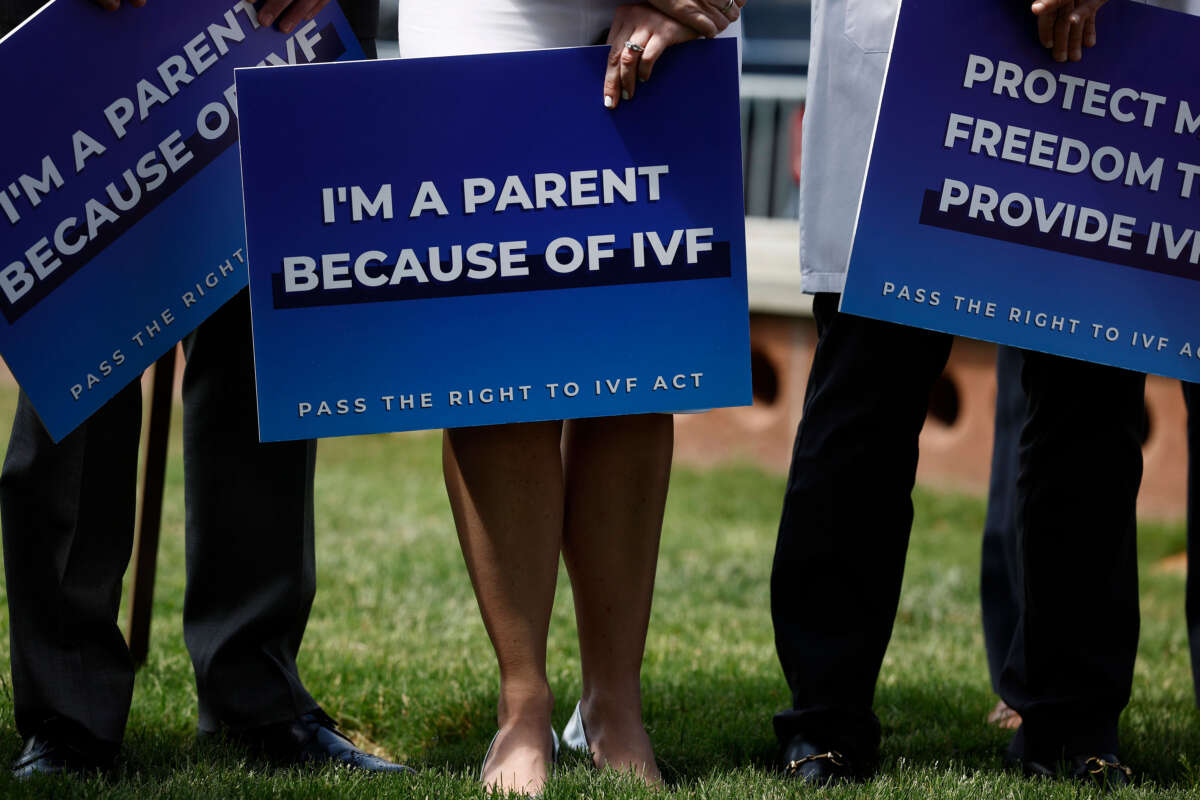Truthout is a vital news source and a living history of political struggle. If you think our work is valuable, support us with a donation of any size.
On Thursday, a bill to protect the right of all Americans to utilize in vitro fertilization (IVF) as a pregnancy option failed after Republicans in the Senate blocked its passage.
The Right to IVF Act sought to protect access to the procedure, which is often used by persons struggling with infertility. The bill would establish a federal right to IVF, barring state legislatures or courts from denying their residents access to the process and requiring insurance companies to cover IVF services.
Conservatives and anti-abortion groups who oppose IVF justify doing so because the procedure requires fertilizing multiple eggs at once within a lab and discarding fertilized embryos that are not implanted within a person’s womb.
Although not prevalent yet throughout the U.S., there are signs that access to IVF could soon come under attack. Earlier this year, the Alabama State Supreme Court ruled that state anti-abortion laws defined embryos as having personhood rights, an action that effectively banned IVF treatments throughout the state. In reaction, lawmakers in the state legislature passed a new law that asserted IVF centers were “immune” from statutes regulating embryos and non-implanted fertilized eggs.
The new law stalls, for now, the possibility of IVF being banned in Alabama. But other states’ courts or legislatures could still regulate access to the procedure, especially in the wake of the federal Supreme Court decision in 2022 that upended abortion rights, allowing states more regulatory powers when it comes to reproductive freedoms.
On Thursday, the Right to IVF Act received a formal vote, where it failed after only two Republican lawmakers, Sens. Susan Collins (R-Maine) and Lisa Murkowski (R-Alaska) joined with Democrats to back it. The remaining 47 Republicans voted against the bill, well over the 40-vote filibuster threshold, blocking it from being passed.
Republicans claimed they opposed the bill for going too far, and offered a more narrow bill for consideration. They also smeared the vote as a Democratic Party-led “partisan campaign of false fearmongering intended to mislead and confuse the American people” ahead of the 2024 elections.
“The only reason why they’re doing this is to try to scare people,” said Sen. John Cornyn (R-Texas).
Sen. Patty Murray (D-Washington), one of the co-sponsors of the bill, disagreed with that assertion, and dismissed the GOP alternative bill as doing next to nothing to protect IVF.
“Republicans have introduced their own legislation so they can pretend to address the same problem they say doesn’t exist, but their bill has huge loopholes that would let states restrict IVF in all different kinds of ways,” Murray said. “It purposefully ignores what happens to unused embryos, and it would do nothing to stop fetal personhood laws from totally upending IVF care.”
Senate Majority Leader Chuck Schumer (D-New York) also chastised Republicans for blocking the bill.
“Protecting IVF should be the easiest ‘yes’ vote senators have taken all year. It is a contradiction to claim that you are pro-family but then turn around and block protections for IVF,” Schumer said.
The issue of IVF protections places Republicans in a precarious position. While the vast majority of Americans support IVF as a morally acceptable option, the far right base of the GOP, driven in part by Christian nationalists who vehemently oppose reproductive rights, makes it difficult for Republicans to support the procedure.
Indeed, the day before the vote, Southern Baptists at their annual convention voted to oppose IVF, calling upon their millions of members to “advocate for the government to restrain” the procedure.
The fine line Republicans have to walk between their supporters and the general views of the American public is evident. Before they voted against the bill, Republicans signed an open letter expressing support for IVF, stating that they recognized the procedure is “legal and available in every state across our nation.” Their vote afterward against IVF has been condemned by many on social media as deeply hypocritical.
A recent poll published this week by Gallup shows widespread support for IVF, with 82 percent of respondents calling the procedure “morally acceptable.” There is a deeper split on how Americans respond to the notion of destroying unused embryos for IVF treatments, with a plurality, 49 percent, saying it’s morally acceptable to engage in that action and 43 percent saying it isn’t. Still, a majority of Americans (51 percent) oppose laws that would give embryos legal protections that people receive.
Media that fights fascism
Truthout is funded almost entirely by readers — that’s why we can speak truth to power and cut against the mainstream narrative. But independent journalists at Truthout face mounting political repression under Trump.
We rely on your support to survive McCarthyist censorship. Please make a tax-deductible one-time or monthly donation.
